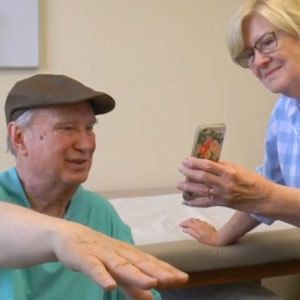
Parkinson's: Moving Forward After a Diagnosis
Upon a diagnosis of Parkinson's or a related memory disorder, here are some first steps to take:
1. Consult a memory disorders specialist
The best place to start is by consulting with a memory disorders specialist so your condition can be evaluated as there may be medicines that can help.
2. Give thought to exacerbating factors.
Parkinson’s symptoms, medication side effects, fatigue, pain, headaches, sleep problems, depression or anxiety can all potentially exacerbate or even cause some memory problems.
3. Consider things that can be improved in day-to-day life.
Many times there are adjustments that specialists can make that actually make a big difference for memory, focus, and cognition. Exercise is obviously a big one, but even getting out and taking a walk on a nice day helps. Mental activity is also helpful; not just doing chores around the house or work, but actually doing a variety of mental activities and hopefully some things that you actually enjoy doing. Stop smoking and certainly consider cutting back on alcohol use as it can have a negative impact on memory and thinking
4. Lastly, outside of Parkinson’s disease, focus on health and being as healthy as possible.
Diabetes, hypertension, cholesterol all directly impact brain health, and therefore certainly can impact memory. In general, make sure that you have yearly follow ups with your primary care physician and any other doctors as a part of your team.
Inova Parkinson’s and Movement Disorders Center
The Inova Parkinson’s and Movement Disorders Center offers a variety of educational, wellness and supportive programs for patients, family and friends. Our ongoing PD3 Parkinson Multi-task Training combines movement, voice and cognition activities, and is taught by world renowned Parkinson experts in physical and speech therapy.
For more information about our programs we invite you to:
- Subscribe to our newsletter, Reaching Out and Keeping in Touch: https://ipmdc.org/newsletter/
- Check out Parkinson and community resources at www.ipmdc.org.
- For more information contact Sonia Gow at sonia.gow@inova.org or 703-375-9987.
About the Authors
Sean Rogers, MD
Dr. Rogers is a board-certified neurologist and fellowship-trained movement disorders specialist. He is co-founder of the Inova Parkinson's and Movement Disorders Center, and serves as Medical Director of the Inova Memory Disorders Program.
Dr. Rogers specializes in the treatment of Parkinson’s disease, essential tremor, Huntington’s disease, tic disorders, dystonia, and other movement disorders, with specific training in deep brain stimulation (DBS) and botulinum toxin injections. He also has specialization in memory disorders such as including the different forms of dementia (including Alzheimer’s disease), stroke, brain injury or infection.
He serves as an Assistant Professor of Neurology at the Virginia Commonwealth University School of Medicine, Inova Campus.
He became interested in clinical neurology while completing his PhD working with Alzheimer’s disease and frontotemporal dementia patients. Dr. Rogers chose to focus on movement disorders because of the dramatic impact that the current pharmacological and technological treatments can have on patients' lives. As part of the medical leadership Inova Parkinson’s and Movement Disorders Center, and Inova Memory Program, Dr. Rogers aspires to help patients restore their quality of life.
Sonia Gow, Program & Community Care Manager
Sonia Gow is the Program & Community Care Manager for the Inova Parkinson’s and Movement Disorders Center. She is supporting and educating patients and the community, in addition to establishing programs that encourage people to keep moving and engage with each other. Sonia also guides patients as they journey through Deep Brain Stimulation (DBS).
Sonia is an experienced patient advocate for people living with Parkinson’s and their care partners. She has volunteered within the Parkinson's community in Northern Virginia, and taught fitness classes specifically for people living with Parkinson's.
Blog
"I like that IMCC focuses on dementia-related problems and provides a focal point for families to network and socially interact in coping with dementia. It provides a community that helps us in our struggle."







